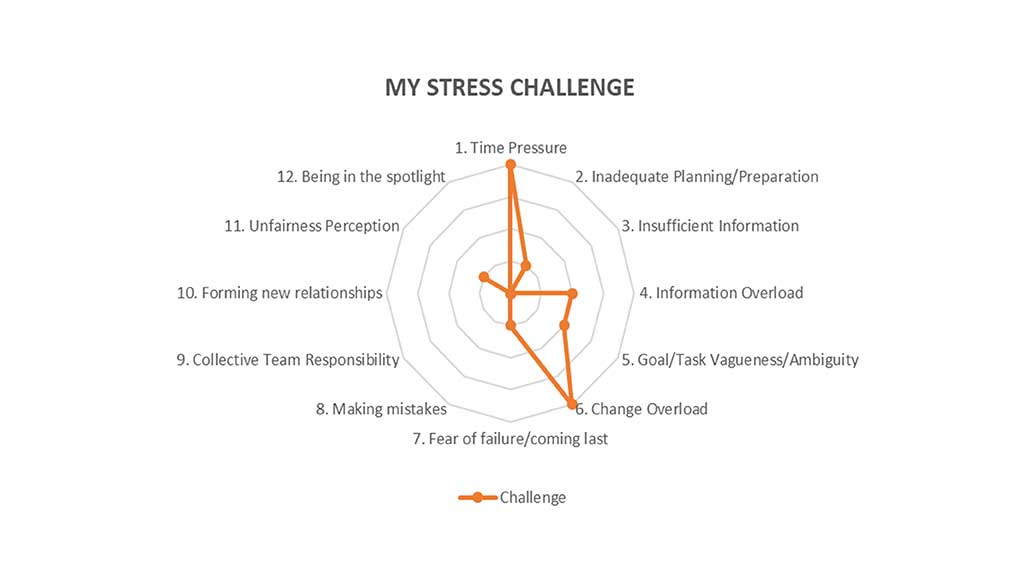Stress is a fact of (work) life!
Stress is a big and growing issue in almost all organizations today. For example, in a recent UK survey [1] of 3,000 employees, 59% of those surveyed identified work as the most common cause of stress in their lives. But it gets worse! Another recent survey [2] of 1,000 employees found that almost half (48%) do little or nothing to relieve this work-related stress, often citing a lack of free time.
Team-based Business Simulations, if properly set up and facilitated, can feel almost like the real thing to participants in terms of the stress experienced. The key ingredients include a good briefing, senior sponsor participation, relevant scenarios, competition between teams and time pressure.
These simulation sessions can be used to put leaders and managers under “temporary stress” in a safe and supportive environment to enable them to develop and practice new stress management skills.
Our normal practice when designing business simulation learning sessions is to keep stress levels to “moderate” which is generally seen as optimum for learning.
However it is quite straightforward to design increased stress levels into a simulation, for example, by flexing any of the following six factors:
- Time Pressure
- Level of Briefing Information:
- Information Overload
- Goal/Task Vagueness/Ambiguity
- Change Overload
- Putting teams in the spotlight
Operational Stress Management 101
You can use almost any team-based business simulation to help managers and leaders learn and practice new stress management skills - here's how:
Stage 0: Session Design
Decide the ways you wish to use the simulation to inject stress factors and at what intensity. Also decide if you need to upgrade the stress levels in the simulation by adjusting the six factors above.
Stage 1: Before starting the simulation
As part of the simulation setup, ask participants to record their natural stress tolerance levels to various operational stressors such as the six factors identified above. This stage is important because different people have different tolerances of stress - something which I find very stressful might be only mildly stressful to you!
Stage 2: Start the Simulation
Now play a couple of rounds of the simulation as normal with all the usual reviews, discussions and debriefs.
Stage 3: Simulation Mid-point
Now ask the participants to record their actual stress levels experienced during the simulation. We have a nice simple “stress test app" which runs on delegate mobile phones and produces a personal stress management profile across 12 common “operational stress factors” as shown in the screenshot below:

For each of these stress factors there are two possible outcomes:
a) The Stress experienced is ABOVE the individual's natural stress tolerance - in this case we can explore different stress management/coping strategies.
b) The Stress experienced is WITHIN the individual's natural stress tolerance - in this case the individual may have a natural resilience to this kind of stress which might present them with some new opportunities as leaders.
Stage 4: Continue the Simulation
Now play the remaining rounds of the simulation with each individual trying out some of their new stress management strategies and leadership styles.
Stage 5: End of Simulation
As part of the normal debrief simply add in a section on what the participants have experienced in terms of stress and the stress management strategies they employed.
Conclusions
Noel Clerkin, who specialises in helping organizational leaders enhance their personal resilience, underscores the value of using simulations in this way:
“Learning new mindsets and behaviours to lessen stress is a critical development area for leaders. Business simulations provide the opportunity to experience the benefits of learning these skills in a hands-on and engaging way. For example, our default reaction when we experience anxiety is to imagine negative outcomes. Using simulation however we can demonstrate that it is possible to experience anxiety and develop the presence of mind to imagine a positive outcome. Participants then get to immediately experience how that can positively impact their performance in the simulation.”
A well-facilitated Team Business Simulation can help managers and leaders refine their Stress Management Skills in a safe and enjoyable environment. In fact, stress management can be added into almost any learning simulation without distracting from the main objectives of the simulation. You do not need to run a business simulation just for stress management!
However you do need to plan the session, build in a little bit of extra time for the stress assessments, have a mechanism for measuring participant stress levels and, very importantly, a facilitator who is comfortable engaging on the important topic of Workplace Stress.
REFERENCES
[1] UK Workplace Stress Report 2018 commissioned by Perkbox
[2] Poll of 1,000 UK employees conducted by Obby